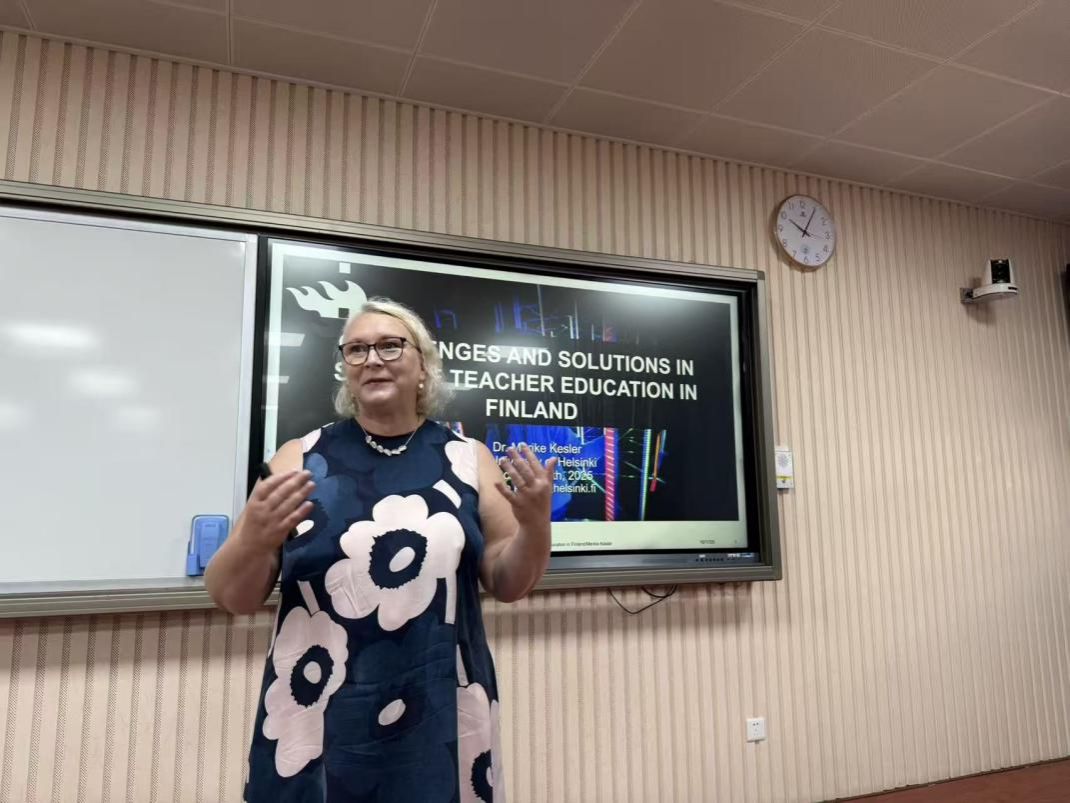On the morning of October 17, 2025, the Faculty of Education at Shenzhen University hosted its Distinguished Scholar Lecture Series in Room A405 of the Huide Building. The lecture, titled "Challenges and Solutions in Finnish Science Teacher Education," was delivered by Dr. Merike Kesler, a researcher and lecturer from the University of Helsinki, Finland. The event was chaired by Assistant Professor Wang Yan, with Associate Dean Zhao Mingren in attendance, alongside faculty members and students from the Faculty of Education.
At the outset, Wang Yan extended a warm welcome to Dr. Merike Kesler. She highlighted Dr. Merike Kesler’s prominence in the field of teacher education, noting her distinguished contributions to research on teacher professional development and science pedagogy. Wang emphasized that the lecture would not only provide faculty and students with insights into Finland’s teacher education system and broaden their research perspectives but also serve as a valuable opportunity to foster collaboration between Shenzhen University and the University of Helsinki.

Dr. Merike Kesler began by expressing her gratitude to the faculty and students of Shenzhen University’s Faculty of Education. She introduced Finland’s basic education system, offering a detailed overview of its curriculum structure and teacher education framework. Dr. Merike Kesler noted that societal and technological advancements have significantly transformed the role of teachers. In Finland, teacher education programs for primary, secondary, adult, and special education vary in their training structures and support systems, including differences in program design and the academic departments responsible for instruction.
Delving into the core challenges facing science teacher education, Dr. Merike Kesler identified the significant gap between theory and practice as a fundamental issue, particularly in terms of the sustainability and coherence of teacher training. To address this, she proposed several innovative solutions, including the development of a "co-teaching model" that integrates pre-service internships with in-service training, the establishment of an integrated framework for education, planning, and assessment, and the adoption of the STEP-C model, which combines the academic background of teacher education institutions with the practical context of schools. Additionally, she advocated for incremental innovations and supplementary activities in teacher education to improve existing training systems. Dr. Merike Kesler also stressed the importance of involving creative and motivated students in the design of teacher education programs to improve the effectiveness of pedagogical models.

Through this lecture, Dr. Merike Kesler not only provided a comprehensive overview of Finland’s science teacher education system but also shared profound insights into addressing current challenges and exploring potential solutions. Her presentation offered faculty and students fresh perspectives and inspiration for research in areas such as teacher education, teacher-student relationships, and curriculum development.
The lecture concluded successfully.